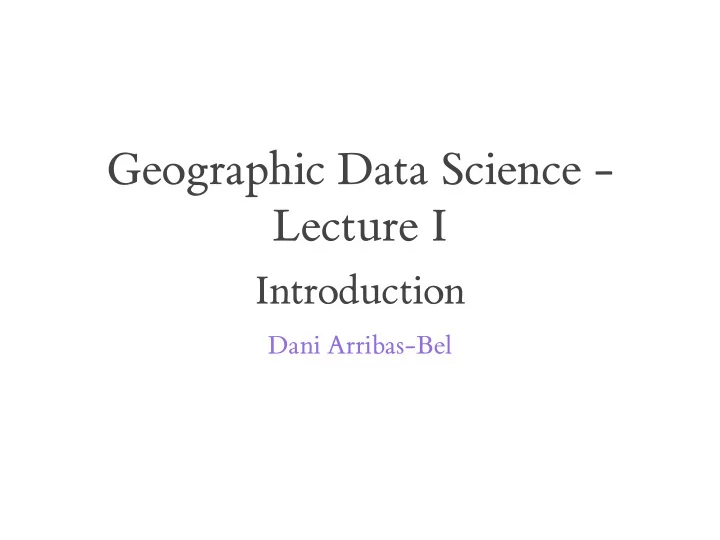

Geographic Data Science - Lecture I Introduction Dani Arribas-Bel
Today This course The (geo-)data revolution (Geo-)Data Science
This course
Quiz Can you think of a real-world context where data and statistics are being used to make a difference? Have you ever heard the term "Big Data" ? Have you ever heard the term "Data Science" ? Have you ever written a line of computer code?
More stats than a GIS course, more GIS than a stats course... ...but in a fun way!
Philosophy (Lots of) methods and techniques General overview Intuition Very little math Lots of ways to continue on your own Emphasis on the application and use Close connection to "real world" applications
Logistics - Website http://darribas.org/gds17 GDS17 ENVS363/563 Geographic Data Science Welcome to Geographic Data Science, a course taught by Dr. Dani Arribas-Bel in the Autumn of 2017 at the University of Liverpool. The timetable for the course is: Lectures : Mondays 9:00am-10:00am, SCTH-MR Computer Labs : Mondays 11:00am-1:00pm, ENG-HHTC Locations SCTH-MR : South Campus Teaching Hub, Main Room [Map] ENG-HHTC : Harrison Hughes Building (Engineering), Computer lab (top floor) [Map]
Logistics - Format 11 weeks of: Prep. materials : videos, podcasts, articles... 1h. approx. (most recommended!) 1h. Lecture : concepts, methods, examples 2h. Computer practical : hands-on, application of concepts, Python (highly employable ) Further readings : how to go beyond the minimum
Logistics - Content Weeks 1-3 : "big picture" lectures + introduction to computational tools (learning curve) Weeks 4-8 : "meat" of the course (lots of concepts packed) Weeks 9-11 : catch up + prepare an awesome Assignment II
Code The Transformation of the Desk Your browser does not currently recognize any of the video formats available. Click here to visit our frequently asked questions about HTML5 video. 0:00 / 0:53 "Even if you won't be a poet, you need to know how to write"
Python
Python General purpose programming language Sweet spot between "proof-of-concept" and "production-ready" Industry standard: GIS (Esri, QGIS) and Data Science (Google, Facebook, Amazon, Netflix, The New York Times, NASA...)
Self-directed learning Prepare for the labs I won't be leading/lecturing at the computer labs Go over the notebooks before the lecture and the computer lab --> If the first time you see a notebook is at the lab, you won't be able to follow on Bring questions, comments, feedback, (informed) rants to class/labs Use the forum (link on VITAL) Collaborate (it's NOT a zero-sum win!!!)
More help!!! This course is much more about "learning to learn" and problem solving rather than acquiring specific programming tricks or stats wizardry Learn to ask questions (but don't expect exact answers all the time!!!) Help others as much as you can (the best way to learn is to teach) Search heavily on Google + Stack Overflow
Assignments Mark (mostly) based on two assignments , due: Week 7 (40%), Week 12 (55%) Coursework Equivalent to 2,500: report ( notebook ) with code , figures (e.g. maps), and text Discussion board (5%) NOTE : recommendation letters only for great students (>70)
The (geo-)data revolution
The (geo-)data revolution Exciting times to be a: Geographer Map fan Data fan The world is being "datafied" ...
"Datafication" Quantification of phenomena through the systematic recording of data , "taking all aspects of life and turning them into data" (Cukier & Mayer-Schoenberg) Examples : credit transactions, public transit, tweets, facebook likes, spotify songs, etc.
"Datafication" Many implications : Window into human behaviour (this course) Opportunities for optimization of systems (Industrial IoT, planning systems...) Issues with intentionality and privacy ...
Why now? Advances in: Computing power and storage Connectivity Geospatial technology
The (geo-)data revolution The confluence of the three (computing, communication and geospatial) is creating large amounts of data. Now, data in itself is not very valuable : Data --> Information --> Knowledge --> Action
Data Science
Methods, tools and techniques to turn data into actionable knowledge
Data Science : Drew Conway Source
Data Science Statistics + ... Computational tools --> Programming (hence this course's tutorials !) Comunication skills --> "Story telling" (hence this course's assignments ) Domain expertise --> Theories about why the data are the way they are (hence the rest of your degree ) Some examples...
Geo -Data Science
Geo -Data Science A (very) large portion of all these new data are inherently geographic or can be traced back to some location over space. Spatial is special. Some of the methods require an explicitly spatial treatment --> (Geo-)Data Science Some examples...
Geographic Data Science'17 - Lecture 1 by Dani Arribas-Bel is licensed under a Creative Commons Attribution-NonCommercial-ShareAlike 4.0 International License .
Recommend
More recommend